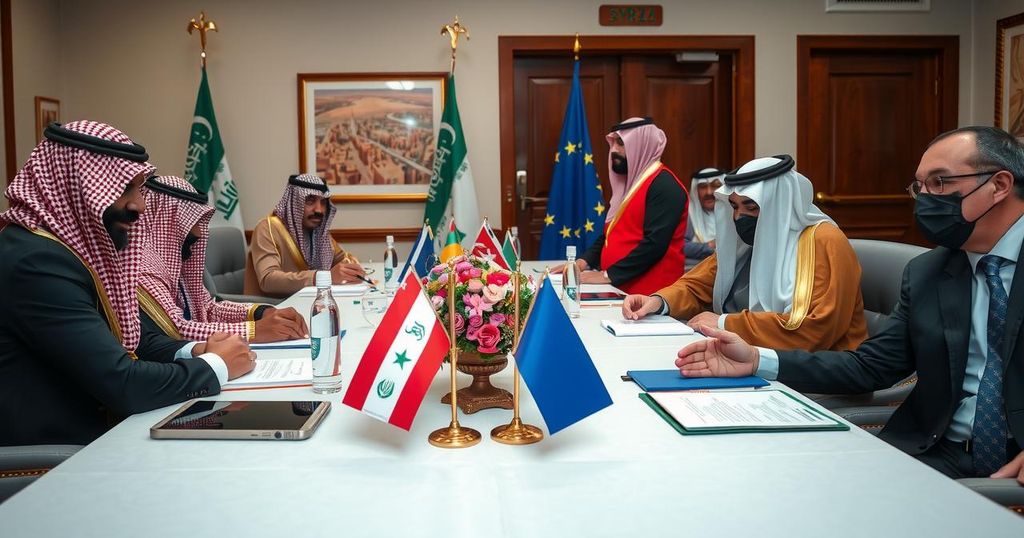Diplomats from the Arab world and EU convened in Riyadh to discuss support for post-Assad Syria, focusing on facilitating a transition to an inclusive government while addressing humanitarian needs and sanctions relief. Saudi Arabia aims to enhance its regional influence amidst ongoing challenges and international scrutiny regarding stability and governance in Syria.
On a recent Sunday, prominent diplomats from both the Arab region and the European Union gathered in Riyadh, Saudi Arabia, to deliberate on strategies for supporting Syria amidst a turbulent political landscape following the ouster of Bashar al-Assad. Saudi Arabia, aspiring to enhance its influence in Syria, hosted a two-part meeting. The initial session involved Arab officials, while the subsequent session included delegates from Turkey, France, the EU, and the United Nations, indicating a collaborative international approach to the crisis.
The meeting comes at a crucial time as Syria’s newly appointed leader, Ahmed al-Sharaa, seeks to alleviate sanctions imposed by Western powers in response to the brutal actions of the previous regime. It is noteworthy that these sanctions significantly impacted Syria’s economy and exacerbated humanitarian crises, with over half a million Syrians losing their lives since the insurgency began in 2011. The European Union has indicated a potential reconsideration of these sanctions if the current administration takes constructive steps toward establishing an inclusive government that respects minority rights.
After having severed ties with Assad’s government in 2012, Saudi Arabia is now navigating its role in this evolving situation. Following a recent meeting where Assad was warmly welcomed back into the Arab League, Riyadh has extended humanitarian aid to alleviate suffering in Syria, and is currently exploring ways to assist in the nation’s recovery and governance transition.
Anna Jacobs, a fellow at the Arab Gulf States Institute, stated that this summit signifies Saudi Arabia’s ambition to coordinate regional efforts for Syria’s recovery, although questions remain regarding the extent of resources the Kingdom is willing to commit. Furthermore, Saudi Arabia’s approach contrasts with the more assertive stances taken by neighbors like Turkey and Qatar, who hastened to restore diplomatic ties with the new Syrian administration.
Additionally, this ongoing dialogue follows previous discussions in Jordan advocating for a Syrian-led transition to an inclusive government, addressing human rights, and combating terrorism. The presence of officials from various countries, including the United States, highlights the international consensus on promoting stability in Syria and addressing the terrorism threat posed by groups such as the Islamic State.
The article discusses a high-level diplomatic meeting in Riyadh involving Arab and European officials aimed at strategizing support for Syria following the fall of Bashar al-Assad’s regime. It highlights Saudi Arabia’s expanding role in the region and its efforts to exert influence over the new Syrian government, led by Ahmed al-Sharaa. The meeting reflects a response to years of civil conflict, humanitarian crises, and international sanctions against the Assad government, emphasizing the importance of a collaborative approach to ensure stability and recovery in Syria.
In conclusion, the diplomatic talks in Riyadh underscore a significant turning point in international relations concerning Syria’s future. With Saudi Arabia positioning itself as a central player in facilitating recovery efforts, the meeting sets the stage for collaborative endeavors aimed at establishing a stable and inclusive government in Syria. However, the challenges posed by lingering sanctions and extremist factions remain critical considerations in shaping the country’s political landscape moving forward.
Original Source: www.france24.com






